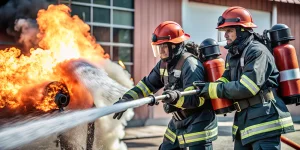In today’s world, safety is a top priority, and with increasing industrialization, fire hazards have become a real concern. To combat these dangers effectively, trained professionals are essential. A Fire Fighting Course provides individuals with the knowledge and skills to prevent, manage, and control fires. This career path offers not only stability but also the chance to make a tangible difference in public safety.
Table of Contents
ToggleWhat is a Fire Fighting Course?
A fire fighting course teaches individuals the fundamental and advanced skills required to handle fire-related emergencies. This program typically includes theoretical knowledge as well as hands-on training. The curriculum varies based on the program level, but key topics include fire science, fire prevention, firefighting techniques, and rescue operations. Many courses also cover the use of specialized equipment, such as hoses, extinguishers, and personal protective equipment (PPE).
Skills Acquired in a Fire Fighting Course
Completing a fire fighting course equips students with both practical and theoretical skills. Some of the main skills include:
- Fire Safety Knowledge: Understanding the nature of fire, its causes, and how it spreads.
- Risk Assessment: Learning to identify potential fire hazards and assess risks.
- Fire Suppression Techniques: Training in various fire extinguishing methods, including chemical, water, and foam extinguishers.
- Rescue Operations: Gaining skills in rescue procedures, including handling smoke and confined space operations.
- First Aid: Learning basic first aid to manage injuries until professional medical help arrives.
These skills are critical in real-world scenarios where time and efficiency make a difference.
Types of Fire Fighting Courses Available
The structure and depth of a fire fighting course vary depending on the level of the course and the target audience. Here are the primary types:
- Basic Fire Safety Courses: For those seeking a foundational understanding of fire safety, basic courses are ideal. These cover basic firefighting techniques, risk assessment, and fire prevention.
- Advanced Fire Fighting Courses: Designed for those interested in a career in firefighting or those who wish to enhance their skills, advanced courses cover complex topics like fire chemistry, advanced rescue operations, and the handling of hazardous materials.
- Specialized Courses: Some courses focus on specific aspects, such as industrial firefighting or handling chemical fires. These are often targeted at professionals working in high-risk environments.
Career Opportunities for Fire Fighting Professionals
A certification from a recognized fire fighting course opens the door to a range of careers in the fire safety industry:
- Firefighter: The most well-known career in this field, firefighters are responsible for extinguishing fires and ensuring public safety.
- Fire Safety Officer: These professionals work in various sectors to ensure compliance with fire safety regulations.
- Emergency Rescue Operator: Specialized in rescue operations, these individuals play a critical role in situations where lives are at stake.
- Fire Safety Instructor: Experienced professionals can teach others by becoming instructors, helping to pass on their knowledge.
Why Pursue a Career in Firefighting?
Choosing a career in firefighting and fire safety is not only about finding a stable job; it’s about contributing to community safety. Professionals in this field make a difference by preventing fires and protecting lives and property.
Moreover, firefighting can be a fulfilling and challenging profession that requires mental and physical preparedness. In addition to job security, this career offers long-term growth, with opportunities for specialization and advancement.
Final Thoughts
Whether you’re seeking a basic understanding or wish to become a professional firefighter, a Fire Fighting Course offers an ideal path. With the right training, you’ll gain valuable skills that not only enhance your career prospects but also empower you to make a real difference in the field of safety.



